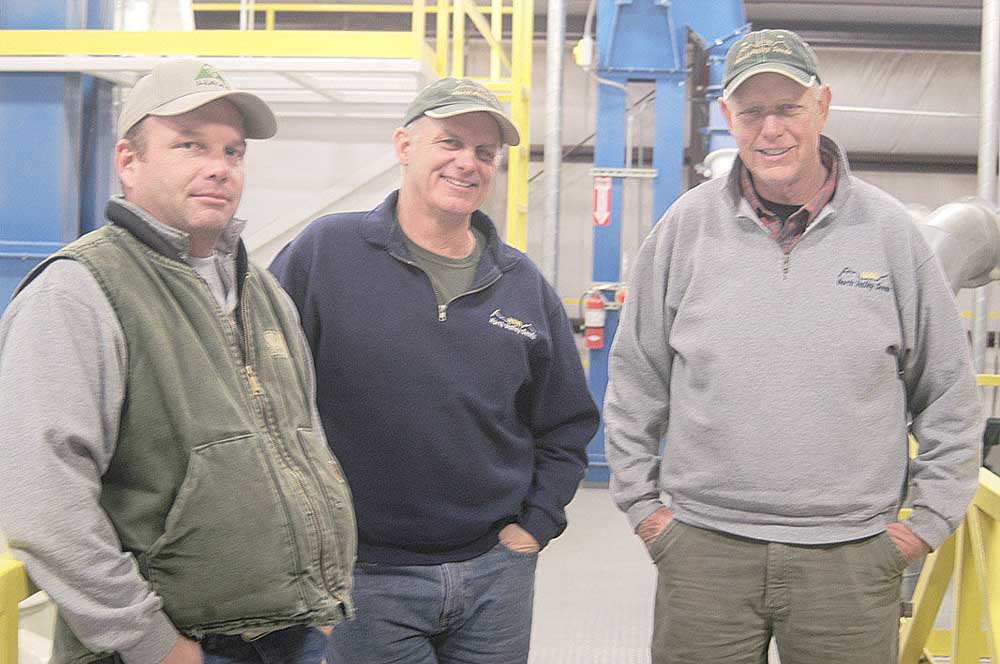Seed cleaning business changes with times
Published 3:40 am Friday, November 20, 2015

- North Valley Seeds principals, from left, General Manager Chris Mattson, and Cam Buck and Paul Kirsch, who own the business along with Cam's brother, Dave Buck. The partnership will mark 40 years in 2016.
WOODBURN, Ore. — Personal relationships are important in business circles, but may count for more in agriculture than most enterprises. It’s a small fraternity and sorority, after all, with membership spanning generations. A mis-step or wrong-headed action between farmers can strain relations for years.
That’s one of the reasons North Valley Seeds’ enduring story deserves a nod. The custom seed cleaning business, involving two families, has ridden the ups and downs of the Oregon grass seed industry for nearly 40 years and is positioning itself for more to come.
The business was formed in 1976 chiefly by Frank Buck, and he brought in farmer Paul Kirsch of nearby St. Paul and his brother, John, as part owners in 1980. John Kirsch eventually left farming, and brothers Cam and David Buck bought their father’s half of the business in 2008. They’ve been partners with Paul Kirsch since.
The business initially offered bulk grain storage in addition to seed cleaning, because wheat was strong in the Willamette Valley at the time. So was perennial rye grass, but most of the commercial seed cleaners were in the south end of the valley.
Paul Kirsch, a grass seed grower, saw the business as a form of vertical integration of his farming operations. He found a like-minded grower in Cam Buck, while David Buck, a full-time CPA, stepped in to handle the financial affairs. Chris Mattson, general manager of the seed cleaning facility, has been with the company 15 years.
The company cleans, custom blends, bags and warehouses seed for a cluster of growers.
Kirsch said he and Cam Buck are customers of the business in addition to being owners, but keep their farms separate and pay the same rate as other growers.
“It’s a real professional relationship, I would say,” Kirsch said. “That’s the beauty of being able to pick your partners. We all have our strengths, the three of us. I knew all of us together would be stronger than just me running the business and still farming.”
Kirsch said he and the Bucks understand the temperament of farmers and run the business accordingly.
“You have to prove yourself over time,” he said. “They are your neighbors. You treat their seed like you treat your own seed, and get it to market in a timely fashion.”
Cam Buck seconds that. Being farmers themselves, he said, they know how important it is to growers and seed companies to “keep quality seed moving out of the valley, so everybody gets paid.”
He believes North Valley has been a stable fixture in the industry.
“We’ve been cleaning and handling seed here in the north part of the valley since the late 1970s,” he said.
Roger Beyer, executive director of the Oregon Seed Council, said North Valley’s principals are “stalwarts” of the industry.
“They’ve been doing it a long time and they know what they’re doing,” Beyer said. “They’re good operators.”
Grass seed has largely recovered from the recession and was Oregon’s fifth most valuable crop in 2014 statistics, with sales of $450 million. But like all of the state’s ag sectors, change is afoot.
Some farmers turned to raising tall fescue instead of ryegrass, while others put in crops such as blueberries and hazelnuts. Meanwhile, the farmers’ co-op Wilco shut down its seed cleaning plant in nearby Donald.
Adjusting to the changes, North Valley put in a new line for cleaning tall fescue seed, which must be kept separate from perennial ryegrass. Tall fescue has gained favor for some uses because it is drought tolerant.
“Some of the guys we clean perennial for also grow tall fescue, but they weren’t coming here” for cleaning,” Kirsch said.
Mattson, the general manager, said over the last two seasons North Valley has doubled its receiving capacity and increased bulk storage by a third. Larger pits allow truckers to dump loads more quickly and return to the field.







